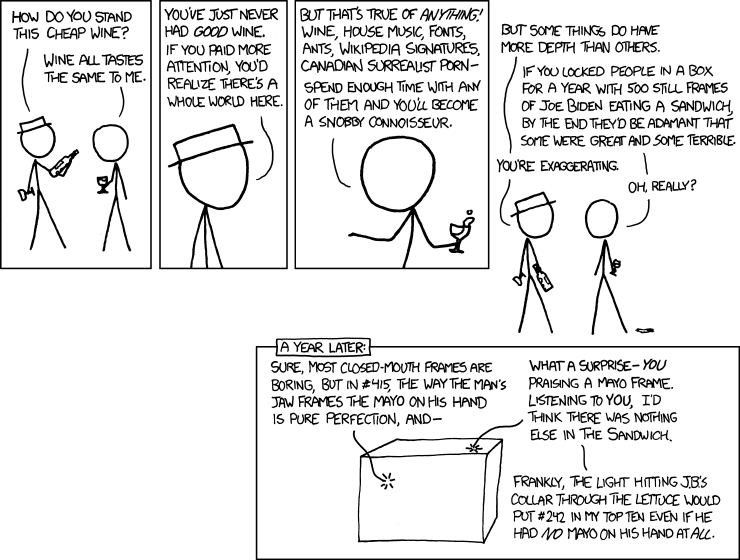In defense of sandwich photos
I’ve seen a lot of internet arguments where someone referenced the xkcd comic below. It’s always rubbed me the wrong way, and one day I opened a blank file to articulate why, so now you get this close-reading.

[Note that this comic was written in 2011, long before Biden was president. If you’d like, you can substitute a mostly-inconsequential public figure of your choice.]
Are the views expressed by second stick figure the same as Randall’s? I think it’s highly likely: the guy in the white hat is usually written to have bad opinions, and he expresses his point in the snobbiest possible way. Plus it would fit with this later comic). So for convenience, I’ll assume the comic’s thesis is that opinions on wine are mostly pointless.
Before we proceed, I should make three things clear about my thoughts on taste:
- While price and quality can be correlated in some regimes, equating the two is paranoid posturing at best and rank classism at worst.
- Furthermore, quality is not objective, and different people can and should enjoy different things.
- If you happen to be a nerd about something inconsequential, “how do you stand [inferior thing]” is generally the worst way to share it.
Alright, with that out of the way, let’s move on:
This comic is usually trotted out as an argument against thinking too carefully about the contents of your glass. It’s the “let people enjoy things” of food and drink. It promises to stand up to snobbery, but replaces it with smarm. So as someone who enjoys tasting new wines (and new coffees, and new beers, and new burgers), I should reject it, much like caring about negative reviews should compel people to reject “let people enjoy things”. Right?
Well, here’s the thing: I think Randall’s point is basically valid. If I spent even a week staring at photos of Joe Biden eating a sandwich, of course I’d notice things about them and start to develop opinions. And the thought process I use to figure out why I like something is similar for wine, fonts, landscapes—anything subjective, really. It’s all just drawing boundaries in a large parameter space (though it’s a bit less true for art, which is made with the goal of communicating something).
This leaves us at an impasse. Either we can admit that caring about details is pointless and stick to surface-level impressions, or we can twist ourselves into ad hoc rhetorical knots to justify why the things we care about are truly special and worthy of our evaluation. What should we choose?
…The correct choice is to take a step back, and admit that arguing about Biden sandwich photos would be fucking awesome.
Imagine if you had strong opinions on Joe Biden sandwich photos, and what’s more, that this were a normal thing in American society. Every week or two, a White House photographer posts a new sandwich frame, and the internet erupts with hot takes about the lighting, or the choice of mustard, or why everything’s been going downhill since the ciabatta era. You find a gem from the archives and text it to your friend, who agrees with your assessment and thanks you for the recommendation. You get to have an opinion on whether the Lettuce-Pattern Tie of ‘15 was clever or just gauche, and you occasionally attend dinner parties where people are interested in what that opinion is.
The only difference between sandwich photos in this imagined world, and wine, beer, or coffee in our current one, is that the latter three are Schelling points. Being the only person to care about something is, let’s face it, kind of excruciating, so the natural choice is something which presents a low barrier to finding other opinionated people.
Wait, is that why so many guys are obsessed with sports? I think I get it now.
Coffee is a perfect example of this. Most American adults drink it every day, and while only a small minority ever become coffee nerds, “a small minority” of Americans is still millions of people. Any sufficiently large city has at least one coffee shop with a knowledgeable staff, and for the especially curious, every variable that goes into a cup is meticulously documented online. You’d have a hard time finding a better thing to nerd out about. Wine is similar, but with more cultural cachet—and hey, it gets you drunk!
The internet has decreased the barrier somewhat, which is why we see so many niche fandoms popping up—if you want examples, scroll through /r/HobbyDrama.
Fans of Paul Fussel might argue that strong opinions on inconsequential things are symptomatic of an upper-middle-class status anxiety which seeks to centers conversations around anything but ideas. This may be true for some, but if the your conversation isn’t jumping between beverages, politics, and god-knows-what-else, you’re clearly drinking with the wrong people.
So yes, let people enjoy things. But encourage them to articulate why they enjoy things, or why they don’t. Listen to them. Argue with them. Experiencing another mind’s perspective on a subtle distinction might be the best feeling there is.